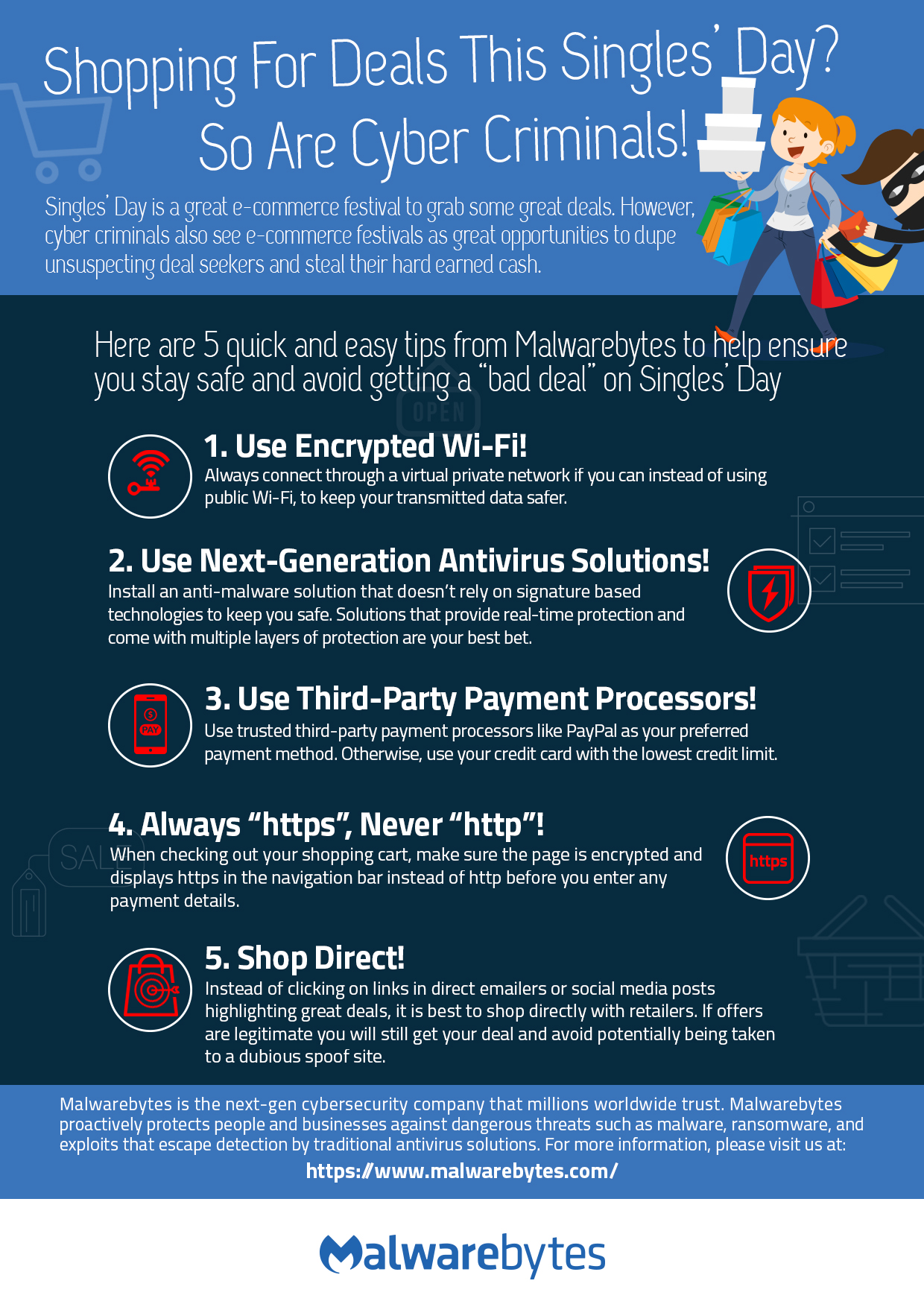Originally a day set aside for singles in China to be proud of their singlehood, Singles’ Day has been transformed into what is arguably the world’s single largest e-commerce festival, thanks to the involvement of The Alibaba Group. In fact, the Alibaba Group alone reported $17.8 billion in sales; six times higher than what was spent on Black Friday (around $3 billion).
Today, Singles’ Day has evolved into a shopping phenomenon that has gained traction beyond the shores of China, with shoppers across Southeast Asia eagerly awaiting previews, hoping to make a killing on the deals set to land on November 11.
However, also waiting to make a killing are cybercriminals, who see e-commerce festivals and heavy shopping holidays such as Singles’ Day, Black Friday, and Christmas as huge opportunities to dupe unsuspecting deal seekers and steal their hard-earned cash. Traditionally, cybercrime activity tends to pick up during festive periods, especially those that involve increased online shopping.
As we await Singles’ Day, many retailers will be sharing promotional links via email, social media, or mobile. Based on past experience, cybercriminals will also be ready to disseminate their own versions of fake promotional links through these channels. These emails from hackers, known as “phishing emails,” could be so well designed as to accurately mimic an email from legitimate and renowned retailers.
Phishing emails would likely contain links to fake promotions, which, instead of giving shoppers a great deal, would instead link directly to malware or ask users to provide personal details that can be abused for nefarious purposes later.
Taking it one step further, entire web pages built to look like legitimate online shopping sites are often built by cybercriminals to take advantage of shoppers. Sometimes hackers even build random e-commerce sites from scratch. These sites are used to steal personal data and even credit card information. And with many deals being time-based in the form of “flash” deals, shoppers sometimes fail to stop and consider the authenticity of a site before rushing to make a purchase.
A quick guide to safe online shopping during Singles’ Day
To ensure you can celebrate Singles’ Day safely and smoothly, here are some basic guidelines to protect oneself from being a victim on Singles’ Day.
1. Beware of spoofed links
Don’t simply click on a link if you can’t be a hundred percent sure it is indeed from the retailer, even if you know the “sender.” To make sure the link is legit, check the sender’s email header and message context. Display the full email address and reply-to address instead of looking at the sender’s name alone. An additional step you can take is to hover over the link to ensure it directs to a legitimate site. Also, be doubly wary of social media posts and texts that offer deals that are too good to be true.
2. Shop at retail websites directly
Instead of keying in personal details into a coupon link in direct emailers or on social media posts, it is wiser to go directly to a retailer’s main website. If the offers are legitimate, chances are more often than not you would be able to find them on the website itself.
3. Check the validity of retailers’ websites
Choosing to shop directly at a retailer’s website is a great first step, but always remember to ensure you are, in fact, on the right website before beginning to shop. Check the URL of the website. If it ends with a “.net” or has a different name in the URL, there is a good chance the site is not legitimate. Also, make sure the sites include “https” at the beginning of the URL. This indicates your data is encrypted whilst browsing or purchasing. Furthermore, check the website copy. If there are numerous grammatical errors and typos, this might not be the website you’re looking for.
4. Install the latest antivirus software
Aside from laptops, shopping through smartphones and tablets has become commonplace nowadays. Therefore, make sure to have a next-generation antivirus software installed, and preferably one that offers multi-layered protection. While having antivirus solutions installed on desktops is relatively common, many of us are guilty of failing to do the same for our mobile devices. Maintaining a multi-layered security solution across all devices will help protect you from all sorts of malware such as worms, Trojans, spyware, ransomware, and more.
While consumers should stay alert of potential cyberattacks when shopping online throughout the year, one should pay extra attention during festive shopping periods such as Singles’ Day. Cybercriminals are ramping up their attempts to target hungry shoppers, who are rushing for the limited hours deep discounts. So stay calm and think twice before taking any actions. Don’t just rush for the best deals and forget the basic concepts of Internet safety. If you keep your head, you can protect yourself from being a victim of cybercriminals during Singles’ Day.











